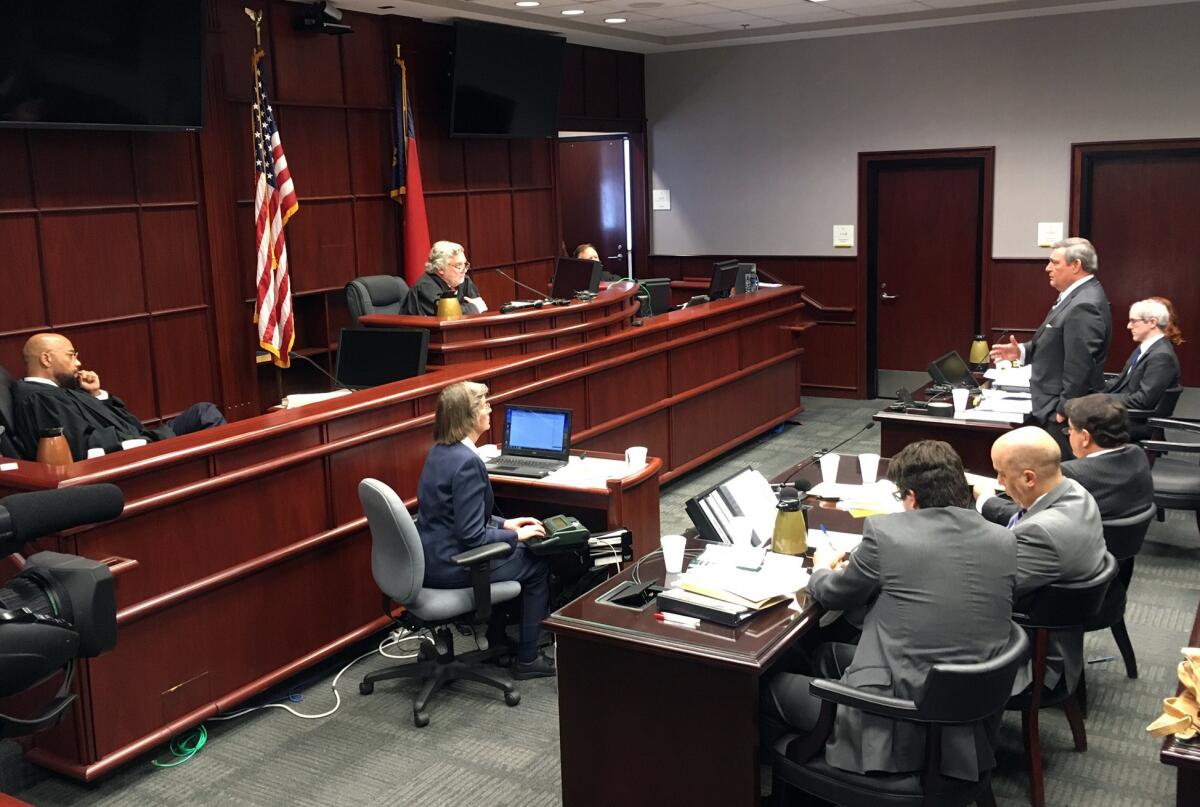Judges hear arguments over restricting North Carolina governor’s powers

- Share via
North Carolina’s new Democratic governor and the entrenched Republican-led Legislature battled in court on two fronts Friday over efforts to restrict the chief executive’s ability to alter the state’s recent conservative direction.
A panel of three state trial court judges spent three hours listening to arguments over whether to continue blocking a law requiring state Senate confirmation of Gov. Roy Cooper’s Cabinet secretaries.
The judges did not say when they would decide whether to continue blocking the law. Any order would be in effect until after a full hearing next month.
Meanwhile, a revamped state elections board met for the first time Friday, hours after an appeals court temporarily reinstated a law stripping Cooper of his oversight of elections. Cooper’s attorneys are asking the state Supreme Court to step in and again block that law.
The General Assembly passed the law in December requiring Senate consent to Cooper’s top appointees. It came in a surprise special session barely a week after Republican incumbent Pat McCrory conceded to Cooper in their close gubernatorial race and just before the Democrat took office.
The state Constitution gives senators “advice and consent” powers with gubernatorial appointees. But a state Supreme Court ruling last year set boundaries on how much lawmakers can shape the governor’s ability to carry out laws through appointees. No governor in living memory has had to have his top aides approved by the state Senate.
Cooper’s attorney Jim Phillips told the judges that voters picked Cooper in last year’s election and supported the proposals he outlined. But the appointments law gives legislators effective veto power over the top aides the governor chooses to run day-to-day government.
“Needless to say, he can’t do that by himself,” Phillips said. “For the governor to be required to mollify the General Assembly, to satisfy them with his appointees, the people that he is going to put the most trust and confidence in, is at the heart of the separation of powers. It goes too far.”
Lawyers for GOP lawmakers countered that although North Carolina’s Constitution establishes the Legislature, governor and courts as separate and distinct branches of government, they are not equal. The General Assembly is superior to the governor and the courts, attorney Martin Warf said.
“The ability to make the laws is a pretty supreme ability,” he said.
“All this is true even though, just like the Legislature, the governor was elected by the people?” asked the judicial panel’s head, Gaston County Superior Court Judge Jesse Caldwell III.
If it was so important to expose conflicts of interest for unelected agency heads with important authority, Caldwell asked, why was the law only passed in late December?
“I just think that the General Assembly, in its wisdom, thinks that it would be positive for North Carolina,” Warf’s colleague Noah Huffstetler replied.
While the court hearing was underway, a newly combined state board of elections and ethics enforcement met for the first time. The new panel is part of election law changes also passed in late December that shift power over running elections away from governors.
Instead of Cooper appointing all members of the bipartisan state elections board, as his predecessors did, and Democrats holding majorities on all state and county elections panels, the parties would evenly divide the slots. Republicans would control elections during even-numbered years, when big races for president, Legislature or other major statewide offices are held.
More to Read
Sign up for Essential California
The most important California stories and recommendations in your inbox every morning.
You may occasionally receive promotional content from the Los Angeles Times.










